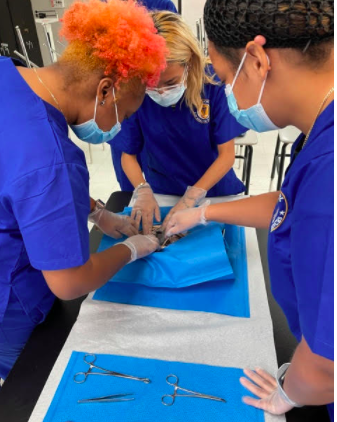
- Remember the physician is a person, just like you.
Working with a physician for the first time can be intimidating to some new Medical Assistants. Physicians’ authority and experience can make them seem like the end-all point of knowledge in the workplace, but it’s important to remember that the physician you work with is a person with thoughts and feelings, just like you. Make an effort to get to know them outside of work-related communications.
You can do this and still maintain a very professional demeanor in your job — just ask a few questions about their hobbies, where they studied, or other interests. Before you know it, you’ll have found a common topic to help you build a friendly sense of camaraderie. This can do wonders in Medical Assisting, just like it does in any other field, because professional collaboration is always stronger when there’s a foundation of goodwill and friendliness to support it. It may make you nervous to break the ice the first time, but you will most likely find that reaching out to find common ground is well worth the nerves.
- Practice active listening.
Your day can be hectic at times, getting information from all directions as a new Medical Assistant, but despite the volume of communication coming your way, you’ll quickly learn to tackle all of it with ease and grace if you make a conscious effort to listen actively. To be an active listener, check in with yourself when gathering information from doctors and patients to make sure you’re not distracted by thoughts about your next meal, your personal life or any other scenario unrelated to the present moment. One way to become an extra-skilled active listener is to repeat back what you hear to the person speaking. While it may sound robotic, it’s actually a great way to make people feel that they’ve been heard and understood. There are plenty of ways to become a better listener and Medical Assistants become better collaborators the more they improve this skill.
- Set the physician up for success at every visit.
One of your main tasks as a Medical Assistant will be managing the beginning and end of a patient visit. You will need to take measurements and vitals, gather information from patients, explain medications and treatments- among many other tasks that make up a patient’s visit. Your physician will be grateful to arrive into the exam room t if you do your part to gather all the necessary information and record it in a clear, concise, and timely manner.
When you fill the physician in on the symptoms the patient is experiencing, try to imagine what you would want to know from their perspective. Put an effort toward giving the physician just the right amount of detail — not too much and not too little. And of course, it goes without saying that taking accurate measurements and recording them properly is central to your success as a Medical Assistant. Making sure to set the physician up for success will improve your collaborative relationship and ultimately put your patient’s health in good hands.
- Speak up confidently when you see an error.
Wherever you choose to work as a Medical Assistant, minding the details is one way in which you can make a real impact. Just because the physician you’ll be working with has tons of professional experience, doesn’t mean that they will have 100 percent accuracy as far as prescriptions, charting, and other documentation goes. Don’t be afraid to mention something if you see it being overlooked. It might take a bit of courage, but it’s worth it to know you’re acting in your patient’s best interest.
- Be self-sufficient.
Sometimes the strongest collaborators are those who know how to find answers to their own questions. You’ll be in regular communication with physicians as a Medical Assistant, but sometimes it’ll be a win to their workday for you to exhaust other sources before bringing them in to help solve a problem. The trick is discerning between which specific situations require the physician’s attention and which don’t. This distinction might take a little time, but being proactive and self-sufficient will make you a huge asset to any medical team; it’s a great way to collaborate by holding your time management and prioritization to a strong standard.
To learn more about our health care programs and externships, contact the Allen School today! We are enrolling now for classes starting soon, and cannot wait for you to become part of the Allen School family. Visit www.allenschool.edu to learn more.
